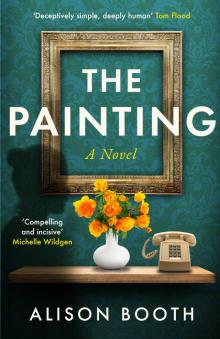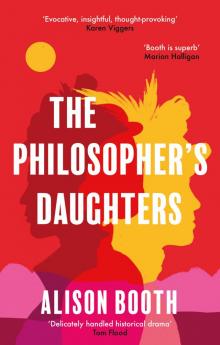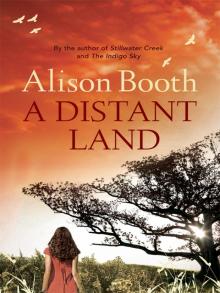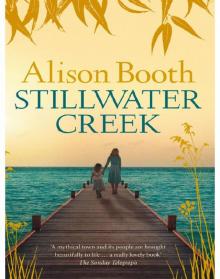- Home
- Alison Booth
The Indigo Sky Page 2
The Indigo Sky Read online
Page 2
Her mother smiled, apparently oblivious of Zidra’s veiled reproof. ‘It was bonzer.’
Zidra winced. An expression like this sounded ludicrous when spoken in a thick Latvian accent. After nearly a decade in Australia, her mother had acquired the local slang but not the diction. You’d think her musical training might have made her more receptive to the rhythms of speech.
‘I just had tea with Mrs Llewellyn and Eileen Cadwallader,’ her mother continued. ‘Where’s Peter?’
‘At the butcher’s.’
‘What for? He killed a sheep only two days ago.’
‘Same reason as you went to see Mrs Cadwallader and Mrs Llewellyn,’ Zidra said. ‘To have a chat.’
Her mother’s grin was reflected in the car’s rear-vision mirror above the windscreen. The brown dress she was wearing was almost the same colour as her eyes.
At that moment, Peter opened the front passenger door and settled himself into the seat. Her mother climbed out of the back seat of the car and into the front. After she turned the ignition and preselected first gear, the car kangaroo-hopped several feet before stalling.
‘Foot on the change gear pedal,’ Peter said mildly.
You weren’t allowed to call it a clutch. That was because the Armstrong Siddeley Whitley was so special that all its parts had different names to ordinary cars. Zidra knew this because Peter had also been teaching her to drive around the home paddock, and she reckoned she was already a better driver than her mother. But it would be two years at least before she could sit for her driving test.
Her mother muttered something in Latvian that was almost certainly indecent, and turned the ignition key again. She’d been driving for three months so you’d think she’d have got the hang of it by now. She insisted on practising, and Peter didn’t seem to care. In fact it was almost as if he enjoyed it, in spite of all the jerking and stalling.
Zidra’s mother began to drive so slowly along the Jingera to Ferndale road that soon there was a queue of cars behind them. When Zidra mentioned this, Peter suggested that she give her mother a break. When she’s had more practice she’ll get her speed up and on no account are you to pressure her to go any faster. Fat chance of that, Zidra thought. Even the bus with the Bradley boys might be better than this slow crawl north.
Once home at Ferndale, Zidra went to her room in the attic. It had originally been used as a boxroom until she’d persuaded her parents to have it painted and insulated and made into her bedroom. Three dormer windows illuminated the space, which was large with steeply raked ceilings. Each window was rather small, but together they shed sufficient light that the room never seemed gloomy, even on the most overcast of days. One dormer looked to the east and the ocean, the other to the north with Mount Dromedary rearing up in the distance, and the third to the west. That was her favourite view, of the folds of hills rising to the distant mountain range, all framed by the pine trees that had been planted when the house was built in the late nineteenth century.
After throwing her school-case onto the bed, Zidra stripped off the Burford Girls’ High School uniform – the navy blue tunic and white shirt – and put on old trousers and a shirt. She glanced quickly at her reflection in the wardrobe mirror. Several months ago she’d decided that she might actually be quite good looking – she’d been lucky to inherit her mother’s regular features and even that high forehead could be disguised by allowing her dark curls to fall forward. Curls that periodically her mother said were just like those of her real father, poor Oleksii, whom Zidra herself always thought of as Our Papa Who Art in Heaven.
With the two letters now in her pocket, she clattered down the stairs and out to the kitchen, where the family’s outdoor boots were lined up, in regimental order, near the door to the back verandah. Her piercing whistle summoned the two dogs, Rusty and Spotless Spot, who knew without being told that she was off to the stone stairway leading down to the beach. Here she perched on the top step while the dogs bounded down to the strip of white sand below.
Carefully she unfolded Lorna’s letter and read it again. She had no idea whether or not the Hunters were still at Wallaga Lake. She certainly hadn’t seen any of them in Jingera lately. Glancing around her at the vast dome of the sky and the ocean in front of her, she thought of how much Lorna must loathe being incarcerated at her school. Training Centre was how it was described. Mama had snorted when she’d learnt that. Training to be domestic slaves, she’d said.
Zidra put the letter away and slit open the fatter envelope from Jim. Three sheets of closely written paper, which she began to peruse with great eagerness. After reading a couple of paragraphs, however, she puffed out her cheeks in exasperation. It wasn’t that liking cricket was evil as such, it was more that inflicting lengthy descriptions of it onto others was deeply inconsiderate, especially when he knew how boring she found team sports. She skimmed through the letter until she reached the final paragraph.
I was interested to read in your last letter that you want to be a journalist. That would suit you, Zid, with your love of writing and history. One of the teachers told me that newspapers offer cadetships, so you might want to check up on that. By the way, did I tell you that my good friend Eric Hall is coming to stay with us in Jingera for a week or so towards the end of the Christmas holidays? He comes from near Walgett and you might remember I visited his family’s property last year. Flat as a pancake out there, so he’ll think he’s in paradise at Jingera.
I’m really looking forward to coming home.
Yours sincerely,
Jim
She laughed out loud at the Yours sincerely, wondering how long she would have to know Jim before he could write anything a bit more affectionate. She always made a point of signing her letters to him With love from Zidra, just as she did with all her friends. With love from Zid mightn’t go down so well if people thought she was a boy, though.
Jim’s abbreviation of her name was nice and no one else ever thought to use it, although it wasn’t as nice as Lorna’s name for her, Dizzy. Together the nicknames made a good combination, she thought: Dizzy Zid. There was something glamorous and light about the name Dizzy.
Now she found that thinking about Lorna was bringing back all those feelings she’d been keeping squashed down ever since reading her letter and, having forgotten a handkerchief, she sniffled into her hands.
Lorna had been taken from her family almost four years ago. Zidra remembered waking from a nightmare at that time, convinced that Lorna was telling her something. Telepathy was how her mother had described it. Of course Zidra hadn’t known then that Lorna was being taken away, only that she was in trouble. After that, Zidra’s own life had become difficult. It wasn’t just the loneliness and fear that she felt after her best friend vanished, but also the vulnerability. It was only Jim’s friendship that had kept her going.
And she hadn’t spoken to Lorna about any of this. Although longing to, she hadn’t seen or spoken to her for years.
Chapter 2
After shutting the living room door behind her, Ilona Vincent hesitated for a moment. Through the windows she could see the dark silhouettes of the pine trees against the paler moonlit sky, but there was no point in drawing the curtains. The evening was mild and there were no neighbours to peer in. She made her way across the room, stumbling on some newspapers Peter had left on the floor, and turned on the lamp by the piano. She wanted to play a particular prelude by Chopin that for some reason had been in her head all afternoon. Something must have triggered off an association, and this piece that she hadn’t thought of for ages, let alone played, was now obsessing her.
When she’d finished the prelude, she rested her wrists on the edge of the keyboard and listened to the sounds of the house. A slight creaking from one corner of the ceiling suggested that Zidra was preparing for bed. The faint clattering of the typewriter, coming from the direction of the dining room,
signified that Peter was dealing with some correspondence. Outside a wind had sprung up. It worried at a loose windowpane and rustled the needles of the pine trees. All of these sounds might have produced a feeling of peace were she not so disturbed by the letter that Zidra had shown her after dinner.
The content of Lorna’s letter had been unsettling, with all that it implied about internment and censorship. Thinking about that reminded her of her own captivity in Europe during the war. Those years that she tried to forget, years that she never spoke about, even with Peter.
Something had to be done for Lorna, she decided. They had to find out where her parents were and somehow get them to Jervis Bay in February. Lorna’s happiness depended on this and helping her was the least they could do.
Now she shut the music book but stayed sitting on the stool. On the top of the piano were a number of framed photographs: Ilona and Peter on their wedding day; Peter in a dark suit grinning at the camera while she wore a lavender crepe dress and matching hat. There was a lovely picture of Zidra on her horse, Star. Next to this was a rather blurred photo of Zidra and Lorna, which Ilona had taken with her now-defunct box brownie camera. The two girls, ghostlike with over-exposure, were standing side-by-side in the front garden of the Jingera cottage; Zidra with a toothy grin and Lorna, a good two inches taller, standing on one leg with the other tucked up behind her. Zidra was wearing her best dress, a rare occurrence, and it was for this reason Ilona had wanted to take a photograph. Now Ilona wished she’d taken it on another day, when Zidra was more casually dressed, for the contrast between her attire and what Lorna was wearing was great. Lorna’s dress was too small for her, the hem was coming down on one side, and on her foot – the only one that could be seen in the photo – she was wearing a grubby sandshoe and no sock.
After replacing the photograph of the two girls, Ilona looked at the picture behind it. This was a studio shot of a young boy, Philip Chapman, her favourite pupil of all those she’d ever taught. Not only because of his talent but also because of his vulnerability. There’d been something exposed about him that first visit to Woodlands over four years ago, when Judy Chapman had interviewed her for the post of piano tutor. As there had probably been in her own demeanour, for she’d so desperately wanted another pupil. And after that interview at Woodlands she’d seen Peter Vincent for the first time. Who would have guessed that she’d end up marrying him and giving up teaching? Now she picked up the photograph of Philip and examined it. One of his eyes was green and the other brown, although that didn’t show in the picture. This unusual combination, together with his frightful stutter and sensitive disposition, wouldn’t make life easy for him now he was at boarding school.
She began to play the Chopin prelude again. Music was always an escape, or a refuge, and things had a way of sorting themselves out in her head while she played.
As soon as she’d finished, Peter stuck his head around the door. ‘You’ve been writing to the Burford Advertiser again. It’s a good letter. I couldn’t help seeing it next to the typewriter. I didn’t know they were still thinking of building that caravan park at Jingera.’
‘They’re not. It’s going to Dooleys Beach. That was a copy of my old letter. It got published two months ago, just before the proposal was knocked back. That’s what happens when you’re a nosy porker. You get things wrong if you don’t read the date as well.’
‘Nosy parker. A porker is a pig.’
‘That’s you too,’ she said, laughing. ‘And a pig is a policeman and a policeman is a bobby and –’
‘Only in England is a policeman a bobby.’
‘Tea for two?’
‘Is that a real offer or something you’re going to play for me?’
‘The real stuff. In a teapot, before bed.’
‘Just my cup of tea,’ he said.
‘Terrible pun.’
‘One of my better ones, I thought.’
‘Have you seen Lorna’s father lately?’
‘Tommy Hunter? No, not for some months. He called into Ferndale a while back. You were out.’
‘Did he say where they were living now?’
‘No, and I didn’t ask. We talked about other things. I just assumed they were still at the Wallaga Lake Reserve.’
After Ilona told Peter about Lorna’s letter, he said, ‘You know it’s going to be really difficult to arrange a meeting.’
‘I know, but we have to try.’
‘Well, the first place to check is Wallaga Lake.’
In the attic, Zidra was sitting up in bed, still wide awake although the hall clock had long ago chimed midnight. Thoughts of Lorna churned in her head. The Hunters would surely be desperate for news from their daughter and longing to see her again. Ilona was always saying how much she missed Zidra if she went away for only a night or two; imagine how Lorna’s mum must feel.
After pulling open the curtain above her desk, she gazed out at the dark shapes of pine trees silhouetted against the white band of stars stretching across the sky. Unable to resist climbing out of this window the night that she’d first moved into the attic bedroom, it was only the slipping of one of the slates that time that prevented her doing it again. Not that the drop was far if the slates fell, but she had a perfectly good set of stairs that were hers alone and no one ever stopped her coming and going.
The image of Lorna crawling out of the Gudgiegalah boxroom roof light stuck in her mind. The tale gave her hope for her friend; a girl who could subvert punishment by escaping. The girl who could turn solitary confinement into a reward.
Zidra imagined Lorna now, perhaps sitting on the roof above the boxroom at Gudgiegalah Girls’ Home, watching a night sky not dissimilar to this. A sky that appeared to their eyes as a hemisphere swathed with an infinity of stars.
Chapter 3
Pushing the telescope along the rails was straightforward. Although the instrument was heavy, its platform ran easily down the tracks that George Cadwallader and his younger son, Andy, had constructed the previous autumn. It had been Andy’s idea to modify one side of the shed in the back-yard to incorporate sliding doors, and to lay a pair of rails from the shed floor out into the garden. From that position, George was able to gaze unhampered at what he termed to himself the celestial hemisphere. His favourite time for stargazing was around midnight. By then most of the lights in Jingera had been turned off, apart from a few street lamps. Naturally it would have been much better if there were no lights at all, although Jingera was still sufficiently small, even with that new housing development opposite the cemetery, that the streetlights were not a serious problem.
While rolling the telescope back into the shed was easy, locking the door afterwards proved to be more difficult. George couldn’t find the key, which he knew he’d been holding just a moment before. In his haste to locate it, he loosened his grip on the torch. It fell to the ground and its beam was extinguished. That meant the bulb had broken and he swore under his breath. He could hear the metallic clunk of the torch as it collided with one of the rails but it was impossible to see where the torch had rolled. Turning, he tripped on a rail and fell heavily to the ground. He seemed to be clumsier than he used to be, and stiffer too. That must be old age creeping up on him, or too much standing behind the counter of Cadwallader’s Quality Meats.
Having established that he was uninjured, George began crawling along the ground in the direction the torch had rolled. Still, I’d rather be crawling about my own backyard in the dark, he thought, than all round the boathouse. That’s where he’d initially intended to install the six-inch telescope that he’d bought four years earlier. But his boathouse was on the far side of the lagoon. With his gammy leg, that would have meant a fifteen-minute walk there and a twenty-minute walk back. As well, there was the worry about security. So in the end he’d followed Andy’s scheme of converting the shed. Andy was such a practical lad, full of good idea
s, though nowhere near as bright as Jim, George’s older son.
George, having by this point found the torch on the ground next to the rails and the key in the pocket of his dressing-gown, locked the shed door. For a moment he leant against the wall and stared up at the sky. All the detail of what he’d seen earlier could only be guessed at now. Such a clear view he’d had tonight of the constellation of Grus, the whooping crane. Stargazing always put into perspective his own concerns, and brought him harmony too, perhaps because it reminded him once more of his own insignificance in the bigger order of things. While that might depress some people, it brought him only happiness. And he loved the way the sky changed as the earth went spinning around the sun, so the only way you could manage to find the same star on consecutive nights was to know the shapes of the various groups or constellations.
He wondered now what could be seen with an even more powerful telescope. A ten-inch one perhaps. Or a radio telescope like the one that had just been opened at Parkes. One of these days he’d like to go there and take Eileen and the boys too. But he’d have to be able to afford a car first. His work van was not a vehicle in which Eileen was prepared to travel long distances – she hated driving about labelled as Cadwallader’s Quality Meats – and it would be a nightmare getting to Parkes and back by train and bus. There was no doubt that transportation concerns lay behind her decision not to go to Sydney this year for Jim’s speech day, although she wouldn’t admit it.
‘Andy and I went last year,’ she’d said when he raised the issue with her the previous evening. ‘I’ll go next year when Jim will be leaving school.’
There was no way George was going to miss Stambroke College Speech Day though. In early December, he would travel on his own to Sydney and lodge in the cheap guesthouse in Rushcutters Bay where they’d stayed last year. Sometimes he felt almost as if Jim’s achievements were his own. Maybe they were, for Jim was his son and now he’d grown so tall he even looked a bit like George in his younger days, when he’d been better-looking and had more hair. Their colouring was the same: green eyes, olive skin and dark straight hair that had a mind of its own.

 The Painting
The Painting The Philosopher's Daughters
The Philosopher's Daughters A Distant Land
A Distant Land A Perfect Marriage
A Perfect Marriage Stillwater Creek
Stillwater Creek The Indigo Sky
The Indigo Sky